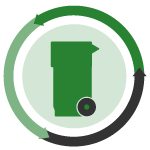 Lower recovered metals prices hurt revenue at a waste-to-energy company, and a group urges a major magazine to use recycled paper.
Lower recovered metals prices hurt revenue at a waste-to-energy company, and a group urges a major magazine to use recycled paper.
There’s an app for that: Residents in Burlington County, N.J. now have an app to help them with their recycling needs. Recycle Coach reminds users of pickup times, scheduled events and acceptable materials, among other things.
Business crackdown: In Calgary, Alberta, businesses will soon be required to follow the same recycling rules as households. Global News reports that businesses are responsible for a third of the material that goes to landfill, 88 percent of which can be recycled.
Pressure on paper: The group Green America is calling on Smithsonian Magazine to print its issues on recycled paper. The group says the Smithsonian produces 19 million copies each year with virgin materials.
Food to fertilizer: An organics processing company has opened a new facility near Sacramento, Calif. California Safe Soil can turn inedible food into liquid fertilizer. The facility can process up to 32,000 tons of organics a year.
Recovered packaging prices: With one exception, the value of recovered packaging in the U.S. at the start of November is essentially on par with the prices paid the previous month. Plastics packaging at the start of November are up or down by a half-cent per pound, according to the grade. On the other hand, the value of recyclable aluminum cans has increased about two cents per pound.
Soap recycling: The Hilton hotel chain is expanding its soap recycling program. More than 1,300 hotels are now participating. Partial bars of soap are recycled into new soap, a practice that has kept more than 570 tons of the material out of landfills.
Revenue down: Waste-to-energy company Covanta reports a decrease in revenue for the third quarter of 2016. Covanta says the increase in its waste and service revenue was offset by lower recovered metals prices.
Bill banning bag bans dies: The Pennsylvania House of Representatives rejected a bill banning local taxes and bans on plastics bags. The bill, House Bill 1280, was rejected on Oct. 24 in a 75-112 vote.


